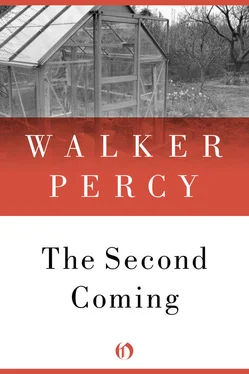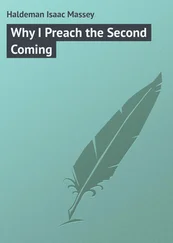At any rate, Will Barrett suddenly bethought himself and, seating himself again at the desk, took up pen and added a postscript.
P.S. I wish there was a way to tell my daughter Leslie goodbye but there is not. Perhaps you will do it for me if it is necessary. If the result of the experiment is positive, then she and I will have found common ground. I will acknowledge her Lord. If not, and you do not hear from me, I ask you to choose a time at your convenience and convey this message to her: that even though she never seemed to need me, I am sorry I was such a rotten father. No doubt the fact that she never needed me sprang from her perception of my unavailability, coldness, shutoffness. These awful distances within a family — was it always so? But I’ve always been suspicious of the word “love,” what with its gross abuse and overuse. There is no cheaper word. I can’t say tell her I “love” her, because I don’t really know what “love” means except as it applies to one’s feeling for children — and then it may only mean one’s sense of responsibility for their terrible vulnerability, which they never asked for. One loves children, especially one’s own, because there they are, through no doing of their own, born into the same low farce you and I are living but not knowing it yet, being in fact as happy as doodlebugs and you and I would do anything to keep them so. Wouldn’t we? Is that love? Perhaps my experiment will shed some light that will be helpful to them later. But there is nothing I can say to her now. She is a Christian and the angriest person I know. When she was five years old and we were living in New York, she got hit by a car in Central Park. I thought she was going to die. She was in great pain. When she lay in her hospital bed she looked up at me and asked me, “Why?” “Why what?” I said, but I knew what she meant. I opened my mouth to say something, but there was nothing to say except that I didn’t know why and that I would gladly have given my life to stop her from hurting, but she didn’t want to hear that. I gnawed my arm at the prospect of her suffering. Is that love? Now when she finishes a Pentecostal service, she loves everybody with a swooning melting tearful smiling love which scares hell out of me. Is that love? Count me out.
Leslie will inherit a great deal of money. She hasn’t needed me since she went to the Brearley School in New York. (Or is it that I imagined that I didn’t need her?) But if my little experiment works out, I hope to find common ground with her, perhaps enough to share with her in her “love-and-faith community”—Jesus, why does this expression give me the creeps?
If not, tell her in your own words, that I love — tell her.
Moving quickly now, he folded the pages and inserted them with the letter to Lewis Peckham into the larger envelope, which he carefully sealed.
Opening a wall safe, he removed an insurance policy, read it, took down his old Harvard hornbook on Wills & Testaments, and wrote a letter to the Prudential Insurance Company requesting a change in beneficiary. He directed them to send the new policy to Dr. Sutter Vaught of Albuquerque, New Mexico.
So it was that Will Barrett went mad. His peculiar delusion and the strange pass it brought him to would be comical if it were not so perilous. This unfortunate man, long subject to “spells,” “petty-mall” trances, and such minor disorders, had now gone properly crazy. This is how crazy he was. He had become convinced that the Last Days were at hand, that the world had fallen into the hands of the only species which knew how to destroy itself along with all other living creatures on earth, that whenever in history this species had invented a weapon, it had forthwith used it; that it was characteristic of this species that, through a perversity or an upsidedownness peculiar to it, while professing a love of peace and freedom and life, secretly it loved war and thralldom and death and loved them to a degree that it, the species, in these last days behaved like creatures possessed by demons; that the end would come by fire, a fire such as had not been seen in all of history until this century of demons, a fire which would consume the earth. The very persons who spoke most about “people’s democracy” or “the freedom and sacredness of the individual” were most likely, he was convinced, to be possessed by demons.
Madness! Madness! Madness! Yet such was the nature of Will Barrett’s peculiar delusion when he left his comfortable home atop a pleasant Carolina mountain and set forth on the strangest adventure of his life, descended into Lost Cove cave looking for proof of the existence of God and a sign of the apocalypse like some crackpot preacher in California.
ALLISON SQUATTED IN the sunlight on the creeper, A coil of rope slung over each shoulder, a double metal block in one hand, single in the other, which she hefted absently as she gazed up at the stove.
It was getting cold. A cirrus feather of ice crystals stood in six miles high from Canada. During the day she and the dog followed the sun to keep warm. At night she curled up in the NATO sleeping bag. How to heat the greenhouse? It was either move the stove or buy a new Peerless kerosene heater. But it offended her sense of thrift and propriety to waste the stove. And she didn’t want to stink up the greenhouse. There was plenty of wood. Pine cones and dead chestnut from the forest and all manner of charred timber from the ruin. So the stove was the thing. Anyhow, she was a hoister, a mistress of mechanical advantage. And here was something to hoist. If she could hoist this monster of a Grand Crown stove, she could do anything in life.
But first count your money. Make your list, assemble your words, then visit the hardware store for blocks and tackle, wrenches, WD-40, plastic pipe and sleeves. Next, Washau Motors for creepers (she would need four, she figured, one for each foot of the Grand Crown).
It was only after she left the hardware store, coils of rope slung over each shoulder, plastic pipe tied in a surprisingly light bundle, backpack heavy with blocks, pulleys, hooks, and wrenches — she had all the words and got the things without pointing — and walked in the service entrance of Washau Motors, that she realized she had forgotten the most important word of all — no, not forgotten his name, had never had his name, never even thought of him as having a name. She had two names though, creeper and Jerry the parts man.
A mechanic was moving on a creeper under a car. It was only when he winked at her that she realized she had been watching him or rather watching the action of the creeper with its queer swiveling wheels.
She frowned and turned away, fell back to reconnoiter. How to get four creepers without the name of the creeper owner? It took a plan. She had one. She had a name, but she needed another. Next to a field of used cars she spied a husky young black man washing a Ford Galaxy on a rack. He wore a Go Wolves sweatshirt. She knew about the Wolves. She came up alongside him. He seemed pleasant and even deferred to her with a small courtesy, turning ever so slightly toward her as if he meant to share with her his hosing down the Galaxy.
“Do you play with the Wolves?”
“Yeah,” he said, frowning. She perceived that he had second thoughts about his courtesy and decided to make up for it.
“Offense?”
He looked at the sky. “Cornerback.”
“Are you going to win State?”
“You better believe it.”
“I had better?”
“What?” he said heavily.
“Are you acting like somebody else?” she asked, eyeing him.
“What?” he asked quickly.
“Nothing. I hope you win.”
“Why, thank you.”
“What’s the man’s name here? I’m supposed to see him but I can’t remember his name.”
Читать дальше












